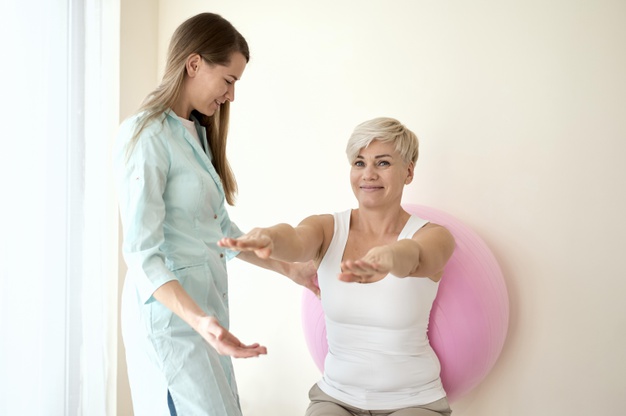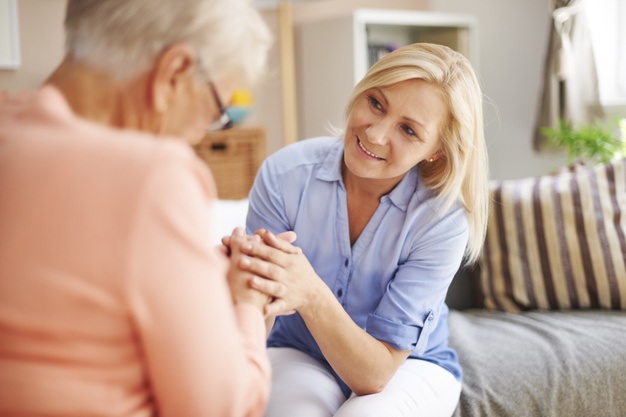Following a formal Parkinson’s diagnosis, you may feel a bit lost and find yourself searching for answers. We understand that this can be an overwhelming time for both you and your loved ones, which is why we have teamed up with specialist charity, Parkinson’s Care & Support UK, to help guide you through the process and show you some of the options available.
At the moment, there is not a recognised treatment to prevent Parkinson’s from progressing. However, you might consider a multifaceted approach including complementary therapies or integrative medicine, such as: exercise, physiotherapy, occupational therapy, nutritional therapy, speech and language therapy and psychotherapy or mental health support.
Even if you are surrounded by loved ones, it is not uncommon to feel alone following a Parkinson’s diagnosis. Looking at the next steps doesn’t have to be daunting, with lots of dedicated research and support in place, you can look forward to the future with a guiding hand.
Many people with Parkinson’s consider regular exercise as a form of medication; it can change the brain and have a positive impact on Parkinson’s symptoms, such as slowing down the progression, in some cases reversing symptoms, and can be great for physical and mental wellbeing. Research from the Parkinson’s Outcomes Project, the largest-ever clinical study of Parkinson’s, found that people with Parkinson’s Disease had a better quality of life when they committed to at least 2.5 hours of exercise a week, compared to those who did not exercise at all, or didn’t start engaging in exercise until later in life.
Supportive therapies
Whilst we know that there is no recognised cure for Parkinson’s, regular exercise can slow down the progression of your symptoms and help you manage them. As well as regular exercise, Parkinson’s Care and Support UK suggest the following as other options to complement your medical treatment.
- Exercise
- Let’s Combat Micrographia Workshops
- Singing
- Mindfulness and Meditation
- Cognitive behavioural therapy (CBT)
- Acceptance and commitment therapy (ACT)
- Nutritional Therapy
- Supplementation
- Deep brain stimulation (DBS)
The following techniques can also be beneficial to slowing down symptoms and making Parkinson’s much easier to live with. It is important that you remain autonomous throughout any course of treatment, which is why we recommend choosing a variety of therapies and activities that suit your needs and lifestyle. As with all of the suggestions, please bear in mind that no two Parkinson’s cases are the same, and it’s best to speak with your doctor to decide the treatment that’s most suitable for you.
Physiotherapy
Neurological physiotherapy is a branch of physiotherapy that specialises in the treatment and management of people who have neurological conditions, such as Parkinson’s. The effects of this treatment can help to build on what you can physically manage, improving your confidence and quality of life.
The ability to move around and stay active is important for people with Parkinson’s, from the day of diagnosis and every day thereafter. The role of physical therapy is to help you keep moving as well and for as long as possible, making each movement stronger as you progress. It has been suggested that, according to recent research, physical therapy — including balance and resistance training — may help improve Parkinson’s symptoms, or help keep them at bay.
Physical therapists are uniquely trained to design an exercise routine that specifically targets the area of movements that you find more difficulty in, and can also give you the best advice on how you can exercise safely and effectively.
A physical therapist can provide:
- Education and self-management advice.
- Exercise routines that can help to improve mobility and quality of life.
- Answers to any questions about exercise that you may have in mind, including the frequency intensity, and duration.
- Ways to exercise safely.
- Help with:
- Normal physical activity routine
- Walking slowly, taking small steps, or sensations of freezing i.e. times when you may feel stuck to the floor, or find it difficult to get started
- Balance or stability
- Posture
- Pain
- Moving around the house (getting up from a chair, moving around in bed)
- Getting around (in/out of a car or bus, elevators, stairs and uneven ground)
- Addressing concerns of falling – including the fear of, have fallen, or anxiety about your safety
- Mobility issues affected by other health problems, such as arthritis pain in your joints or muscles, endurance problems caused by a lung or heart condition, surgery, or even broken bones.
Occupational therapy
Occupational therapists can support someone affected by Parkinson’s whose condition has stopped them from safely doing the activities that matter to them. They identify why you are having difficulties with daily tasks and can work with you to arrange support.
Occupational therapists help by changing your environment, practising using new equipment and helping you and your carer to work out practical solutions using different techniques.
Occupational therapy is invaluable for people with Parkinson’s, especially since the COVID-19 pandemic. It helps people to remain active by providing them with the means to build confidence and make the most of life.
Here at Helping Hands, we can work alongside your occupational therapists to provide assistance with things like personal care and preparing meals to enhance your life in the areas you need it.
Speech and language therapy
Parkinson’s can cause dysphagia (problems with swallowing), hypophonia (low voice volume) and monotonous speech. Problems with speech and swallowing can make a big impact on the life of someone with Parkinson’s, but can be helped by seeing a speech pathologist or speech therapist.
While there are some common signs of difficulty swallowing, it is important to remember that people with Parkinson’s may not always show (or be aware of) them. For example, Parkinson’s can impact the cough response – a natural reflex that protects the airway during eating, drinking or swallowing saliva. Because of this, people with Parkinson’s may not always cough during meals, even though they may be experiencing problems with swallowing.
Assessment by a speech and language therapist, which may include an X-ray of your swallowing, is important for assessing swallowing problems in Parkinson’s and providing the right long-term support for you.
Speech therapy can help people affected by Parkinson’s to improve impairments and maintain as many communication skills as possible. They can also teach non-verbal communication techniques, helping you to manage your symptoms long-term and feel confident in your social interactions. They also teach techniques that conserve energy, including non-verbal communication skills, to help manage your symptoms long-term and ensure you are confident in your social interactions and stay connected with your loved ones.
Possible Medications
The choice of medication treatment depends on a number of things, including the symptoms you have, age and other existing health issues (and medications being used to treat them). Dosages vary greatly depending on a person’s needs and metabolism.
If prescribed with Parkinson’s medication, you’ll be given all the information you need to take it correctly. It’s important to note that, with Parkinson’s medication, it often needs to be taken at specific times, so it’s worth setting reminders for yourself to ensure you get the most benefit.
Since most symptoms of Parkinson’s are caused by a lack of what’s called a ‘happy hormone’ – dopamine – in the brain, many Parkinson’s medications are aimed at either temporarily topping the hormone up or copying what it does. These types of medications are called dopaminergic medications, which generally help reduce muscle rigidity, improve speed and coordination of movement, and can reduce any tremors.
A type of dopaminergic therapy is a drug called Levodopa, which is most commonly used for its effective treatment of Parkinson’s symptoms. It is absorbed by the nerve cells in your brain and turned into dopamine, which is then used to send messages to the parts of the brain that control movement.
It is important to remember that prescriptive medications for Parkinson’s can produce a variety of side effects, which you can discuss with your doctor and then move forward with a type of treatment that you feel most comfortable with.
How companionship aids in treating Parkinson’s
Research has shown that companionship and socialising can really improve the wellbeing of people with Parkinson’s, which can contribute to a longer and happier life.
As Parkinson’s progresses, some people find that their social networks may not be as strong as they used to be and television, radio and pets often become their main source of companionship.
Progressing symptoms can cause a lack of confidence, meaning you may not feel comfortable getting out and about on your own, and if you aren’t able to drive, being on your own can easily turn into loneliness.
Feelings of embarrassment from Parkinson’s symptoms can also make people become more withdrawn and less willing to socialise, but having regular social interaction is vital to maintaining good mental wellbeing.
We know the value of companionship here at Helping Hands, which is why we focus on providing our customers with a well-rounded experience that enhances both mental and physical wellbeing.
Constant support
We understand that being diagnosed with Parkinson’s can be extremely daunting for you and your surrounding family. It may at times feel as though your life has been turned upside down, and the prospect of being dependent on medication and the worry of the side effects that come with them are just some of the reasons why people become fearful.
That’s why we’ve partnered with Parkinson’s Care and Support, a charity who can help guide you and ensure that you don’t go through your Parkinson’s journey alone. They also provide a range of information and support such as:
- Free face to face and online exercise classes throughout the UK.
- Free respite care for family carers of those with Parkinson’s who may be struggling to take care of their loved ones or who otherwise need additional support. Parkinson’s does not just affect the person with the condition and loved ones can be hugely impacted both emotionally and physically, so respite care gives carers a much-needed break from the unwavering responsibilities of looking after a loved one, and a chance to prioritise their own health and wellbeing.
- Free neurological physiotherapy for people with Parkinson’s who typically may not be able to attend a local exercise class due to physical limitations.
- Diet, nutrition, exercise, mental health, holistic health, wellness, complementary and alternative treatments and therapies as well as services and products, to improve quality of life for those with Parkinson’s.
- Fund online social and community-based events and activities through their PDTogether groups, reducing isolation amongst people with Parkinson’s and their loved ones.
- Free Parkinson’s mental health support hub, exclusively for people affected by Parkinson’s.
A helping hand…
From a short daily visit to help with gentle exercises, to round-the-clock care to support with personal care, household chores, medication administration and companionship, here at Helping Hands we provide specialised Parkinson’s care to help you live happily at home.
Whether you want to spend more time as a family or you’d like to alleviate some responsibility from a loved one, you can apply for free respite care with Helping Hands through Parkinson’s Care and Support. Alternatively, if you’d like to arrange some dedicated ongoing care through Helping Hands call 0333 060 2687 or request a callback and we will call you.
Page reviewed by Raj Senniappan, Occupational Therapist on March 15, 2021



